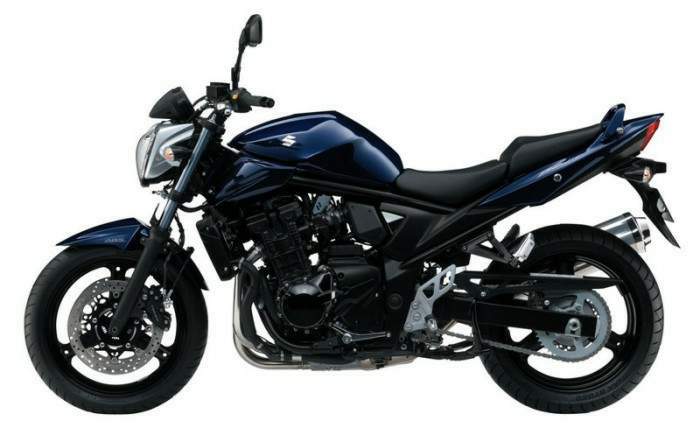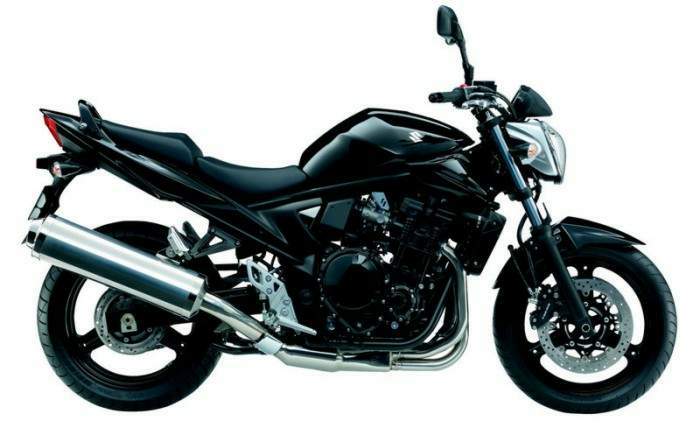
|
|
|
|
|
|
Classic Bikes
Custom Bikes
Individual
Racing Bikes AJP
AJS
Aprilia
Ariel
Avinton / Wakan
Bajaj
Benelli
Beta
Bimota
BMW
Brough Superior
BRP Cam-Am
BSA
Buell / EBR
Bultaco
Cagiva
Campagna
CCM
CF Moto
Combat Motors
Derbi
Deus
Ducati
Excelsior
GASGAS
Ghezzi Brian
Gilera
GIMA
Harley Davidson
Hero
Highland
Honda
Horex
Husaberg
Husqvarna
Hyosung
Indian
Jawa
Kawasaki
KTM
KYMCO
Laverda
Lazareth
Magni
Maico
Mash
Matchless
Mondial
Moto Guzzi
Moto Morini
MV Agusta
MZ / MuZ
NCR
Norton
NSU
Paton
Peugeot
Piaggio
Revival Cycles
Roland Sands
Royal Enfield
Sachs
Sherco
Sunbeam
Suzuki
SWM
SYM
Triumph
TVS
Ural
Velocette
Vespa
Victory
Vincent
VOR
Voxan
Vyrus
Walt Siegl
Walz
Wrenchmonkees
Wunderlich
XTR / Radical
Yamaha
Zero
Video
Technical
Complete Manufacturer List
|
Suzuki GSF 650N Bandit
|
| . |
|
Make Model |
Suzuki GSF 650N Bandit |
|
Year |
2009 - 10 |
|
Engine |
Air/oil cooled, four stroke, transverse four cylinder, DOHC, 4 valves per cylinder. |
|
Capacity |
656cc / 40.0 cu in |
| Bore x Stroke | 65.5 x 48.7 mm |
| Compression Ratio | 11.5:1 |
| Cooling System | Air/oil cooled |
|
Induction |
Fuel injection |
|
Ignition |
Electronic |
|
Starting |
Electric |
|
Max Power |
62.5 kW / 85 hp @ 10500 rpm |
|
Max Torque |
64 Nm / 6.5 kgf-m / 47.2 lb-ft @ 8900 rpm |
|
Transmission |
6 Speed |
|
Final Drive |
Chain |
|
Frame |
Double cradle |
|
Front Suspension |
41mm Telescopic fork, preload fully adjustable |
|
Rear Suspension |
Link type, oil damped, mono-shock, spring pre-load 7-way adjustable, rebound damping 4-way adjustable |
|
Front Brakes |
2 x 290 mm Discs, 2 piston calipers |
|
Rear Brakes |
Single 240 mm disc, 2 piston caliper |
|
Front Tyre |
120/70 ZR17 |
|
Rear Tyre |
160/60 ZR17 |
|
Dimensions |
Length: 2110 mm / 83.1 in Width: 770 mm / 30.3 in Height: 1090 mm / 42.9 in |
|
Wheelbase |
1440 mm / 56.7 in |
|
Ground Clearance |
130 mm / 5.1 in |
|
Seat Height |
770 - 790 mm / 30.3 - 31.1 in |
|
Dry Weight |
215 kg / 474 lbs |
|
Fuel Capacity |
20 Litres / 5.3 US gal / 4.4 Imp gal |
|
Consumption Average |
4.8 L/100 km / 20.9 km/l / 49.2 US mpg / 59.0 Imp mpg |
|
Standing ¼ Mile |
12.5 sec |
|
Top Speed |
198.7 km/h / 123.5 mph |
| . |

The Bandit 600 virtually created the middleweight budget bike class when it appeared in 1995. Based around a similar design to the 1990 Bandit 400, the Bandit 600 used an oil-cooled engine in a basic steel frame. Budget suspension and braking components kept costs down, and the Bandit was a lively, capable performer. It had just enough power to count as a 'big' bike while remaining unthreatening for novices, so was a popular choice for post-test riders. The traditional round headlamp and chrome-finished exhaust were matched by a colour-coded frame and silver-finish engine which gave the Bandit a healthy dose of attitude. The first update for the Bandit, in 2000, had a new frame and updated TPS carburettors.

Suzuki's 600 Bandit gets a makeover for 2000, but it still isn't packing the firepower to take on a Fazer or Hornet Masturbation sends you blind; Hale and Pace are funny, Chihuahuas are proper dogs; Suzuki's 600 Bandit is, and has always been, the best value for money 600 tor learners and experienced riders alike. All the aforementioned are self-perpetuating myths, all utter pants. The first example is categorically disproved by the fad 1 rev can spot a bacon veggieburget at six miles. I simply apologise lor reminding you of the second and making you feel slightly sick.
The third is proof positive of the love the British have for animals and old people - few have the heart to tell an old dear she has a bald rat on a piece ol string. And the fourth? the fourth example is one lor which bike journalists should place their necks in the blunt guillotine of collective complacency, for by their labours alone has the Bandit continued to be thought of as an outstanding bargain. For a couple of years the Bandit was better value than a divorce lawyer who turns out to be a hitman. And then the world moved on. Soon Honda had slashed the price of its I lornet to within a couple ol hundred sovs of the Bandit. A smoother, faster, sharper bike -b\ a country mile - than the Suzuki. And they seem to stay fresh longer too. Every Bandit more than six months-old that I or a bike-scribbling colleague has ridden seems to elicit a stream of 'but'-s. As in "it's alright, but it seems really slow these days", or "it's quite nice, but one of the brake discs feels warped".
So, time for a new Bandit six then.
Time to get busy bolting together a new version with all the qualities that drew
apprentice nutters to the original bike back in 1994 and away from the plastic
fantastics. A basic motorbike with minimalist styling and hooligan tendencies,
an outstanding bargain capable of delivering fun and practicality in equal
measure - or so we'd hoped.
But woe is us, for instead Suzuki have majored on the other side of the Bandit,
the bits that made it appealing to learners, the soft, woolly stuff. Rough edges
have been smoothed and in the process much of the Bandit's character has been
polished away.
Regardless of much of the old Bandit's repertoire descending into mediocrity, it could still raise a worthwhile grin. In El Bandito's cantina, the treacle on the taco was the ability to point tyre tread at the sun god. Wheelies. And wheelies are good. But these days bikes that pull decent whoopsies are common as soft turds in the dysentery ward of Bombay District Hospital and Curry House (salmonella phall and pilau rice a speciality).
The new bike can deliver grins too, but only by dint of the fact it has an engine and two wheels - a sure-fire recipe for tooth exposure if ever there were one. But it wheelies no better than its predecessor, so no progress there. In fact, I reckon it's a little harder to get up thanks to a longer wheelbase, more weight, what feels like slightly more forward-biased weight distribution and no more outright power. No, don't rush down to Specsavers, you did read that right - this version has no more top end than the last.
If only they'd borrowed something from the GSX-R600. The air-cooled motor just doesn't punt out enough ponies. Had Suzuki crammed the GSX-R mill and suspenders into a neat, petite, sub-200kg chassis like the old Bandit's they'd have had a bit of a result on their hands. The motor does boast the addition of a throttle position sensor and re-worked exhaust, which smooth the delivery, help throttle response and boost midrange torque a tad. And the bike feels smoother courtesy of new engine mounts.
But it feels sterile too, with the
motor delivering silky, seamless lack of power, through a silky, seamless
gearbox, from just above tickover to the redline.
Due to the lack of anything that could be termed a powerband, overtaking only
ever gets exciting when you think you're not going to make it. Your average
1600cc car feels more dramatic. With no extra zip and an extra 8kg (which seems
somewhat contrary to Suzuki's current ad campaign), it has to be accelerating
slower than the old bike - that's science that is.
Handling-wise the new Bandit is a mixed bag next to the old. Its chunky new frame, with a longer (3mm) wheelbase, but a claimed reduction in rake and trail byway of compensation (sorry about the proliferation of brackets, but the opposite would appear true, with no change in trail, and slightly more rake if Suzuki's own specs for '99 are to be believed), steers pretty well at all speeds and better on the turn-in. But the wider BT56 radials are more likely to have an effect than any minor chassis tweaks.
Unadjustable 41mm forks are unchanged beyond internals with revised damping rates. And they do feel more controlled. Likewise the rear spring's damping is now adjustable four ways and jolly well in tune with the soft nature of the rest of the bike it is too. On the road both ends coped well with rippled and smooth surfaces alike.
The front end dived less on the brakes too. Brakes which have been improved in power, and especially feel, thanks to bigger pistons at the action end. The brakes, damping and a lower, wider seat all make the new Bandit a more comfortable, civilised and easier ride.
Suzuki it seems haven't even tried to take on the likes of the Hornet and Fazer, but instead find themselves in the same territory into which they stuck Yamaha's Diversion 600 when they launched the Bandit. The Bandit has become a quite horribly sensible bike. Especially if you yourself are horribly sensible. In which case you can run your fingers over the enticing bungee hooks and wow chicks with talk of the extra litre of juice you now pack. Better still, fit the 33bhp restriction kit and the money you save on tyres can go towards an accountancy course.
|
Any corrections or more information on these motorcycles will be kindly appreciated. |